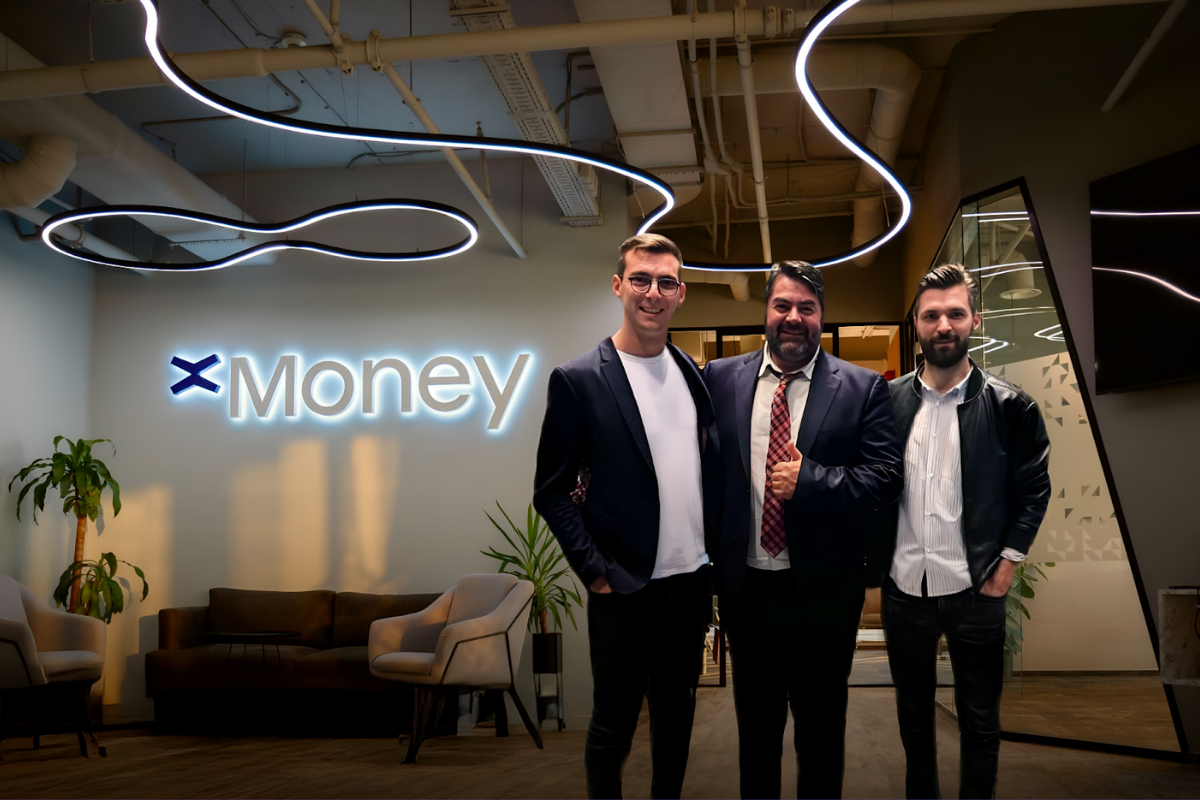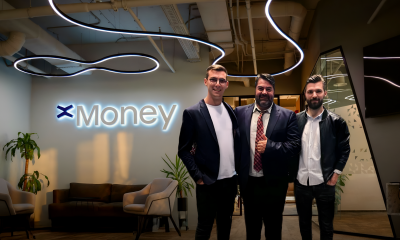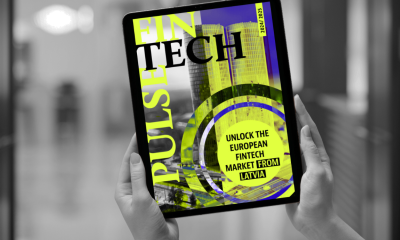Fintech
Changing Lives, Delivering Value: Quoin Pharmaceuticals is Making the Balancing Act Look Easy

New York, New York–(Newsfile Corp. – February 8, 2022) – PCG Digital – Emerging specialty pharma company, Quoin Pharmaceuticals (NASDAQ: QNRX), coined the phrase ‘Rare diseases are only rare if you don’t live with one’ to emphasize its own mission: to deliver unique solutions to help treat rare disorders that have no approved treatments or cures.
Quoin Pharmaceuticals
To view an enhanced version of this graphic, please visit:
https://orders.newsfilecorp.com/files/6513/113039_af06e95a549d7b9d_001full.jpg
Quoin has a proven ability to take a product from concept through to commercialization, thanks to the credentials of the management team who have a highly successful track record of product development, M&A, IPOs, deal making and fundraising of more than $200 million in public and private markets.
Biotechs count on an innovative pipeline and external collaborations for growth, scaling and fundraising. As a biotech focused on developing and commercializing therapeutic products for rare diseases, Quoin has shown it has all of the above: the ability to raise money and make judicious use of it to advance the company while delivering value for investors.
With its promising pipeline of clinical-stage products, clear pathway to regulatory approval and smart strategy for getting therapeutics to those who need them most, Quoin seems poised for success. We sat down with Michael Myers, CEO of Quoin Pharmaceuticals, to get his take on what the future holds for Quoin.
Q: Quoin Pharmaceuticals has had an exciting introduction to the market followed by some impressive company milestone announcements. It’s clear the company is focused on delivering long-term returns to investors. Can you talk about some of Quoin’s investment highlights?
A: Quoin is new to the market but a lot of work has gone on behind the scenes since the company was founded in 2018. Our lead asset, QRX003 for Netherton Syndrome, will enter clinical trials in the first half of this year. This therapeutic potentially qualifies for Rare Pediatric Drug Designation and we have received constructive and positive feedback from the FDA providing us with a clear path forward to approval. Approval of QRX003 could result in Quoin receiving a Priority Review Voucher with a potential, non-dilutive value of approximately $100 million. We have sufficient funding to complete our clinical work through the middle of 2023 with $25 million in committed funds from Altium Capital.
Q: Quoin appears to be very patient-focused. Can you tell us more about that?
A: Rare skin disorders such as Netherton Syndrome are debilitating and have no treatment beyond managing the symptoms, which include pain, redness, scaling, itching and infections. Living with a rare disease can be isolating and stressful for patients and their families, so we are 100% committed to doing everything we can to try to get our products to every single patient who needs them. As we work toward securing regulatory approvals in our core markets of the US and EU, we are also establishing relationships with distribution partners worldwide. To date we have signed exclusive agreements for QRX003 covering the MENA region, Russia and the Commonwealth of Independent States, Australasia and key markets in Latin America. We are in advanced discussions with potential partners in a number of additional territories, with a view to be able to reach all Netherton Syndrome patients globally.
Q: Can you tell us more about your lead candidate, QRX003 for Netherton Syndrome?
A: Put simply, Netherton Syndrome is the result of unregulated hyperactivity of skin proteases called kallikreins. This activity causes excessive skin shedding, leaving a patient’s skin very thin and susceptible to infections, atopic eczema and skin cancer. QRX003 is a broad spectrum serine protease with powerful anti-inflammatory and antioxidant action. It works by down regulating the activity of the kallikreins, reducing shedding and allowing skin architecture to recover. Finally, QRX003 provides a barrier over the skin, limiting penetration by unwanted environmental agents.
Q: Drug development is complex and challenging and many small biotechs struggle to go from clinical trials to getting product to patients. Why is Quoin different?
A: We are leveraging our extensive experience in this area to ensure that we are covering all of our bases along the development pathway. For example, we made sure right from the beginning that our contract manufacturers have the capacity to seamlessly move from clinical scale to commercial scale production with no change in facility or personnel required. In addition, we have engaged top level quality control consultants from day one who are ensuring that everything that is done on our behalf by our contractors is at the highest level of compliance.
Many small biotechs overlook these basic activities and focus solely on generating clinical trial results instead of the bigger picture of getting products to patients. We have a dual strategy. While we are advancing our therapeutics through clinical trials and the regulatory process, we are simultaneously working to create the most favorable market environment for our products once they are approved. Some examples of this are identifying patient populations and establishing strong relationships with the foundations that support these patients and their families. We are developing close ties with leading dermatology experts and treating physicians so that they are aware of the product and its development status.
Q: What is the market opportunity for QRX003?
A: We believe we have a long-term marketing opportunity for QRX003. It will be a ‘whole body, whole life’ topical therapeutic, that is applied to the patient’s entire skin surface once a day, every day, for life. We believe we are very well positioned to capture a very significant proportion of the entire Netherton Syndrome population and, in doing so, deliver excellent long term results for our shareholders.
Q: What is your strategy for commercializing Quoin’s products?
A: Our management team has deep experience in commercializing therapeutics, so we have a very clear strategy for getting our products to market. As mentioned, we are establishing distribution partnerships that will allow us to reach patient groups in most parts of the world, and we expect to announce a number of new partnerships in the first half of this year. There are several important value propositions about these partnerships that I’d like to highlight.
First, by establishing these partnerships early, it enables our partners to develop a deep understanding of the market in their respective territories, establish relationships with foundations, KOLs and also address reimbursement issues so that when the product is approved, they are fully ready to launch and maximize the commercial opportunity for the product. Second, many of the countries where we are establishing these partnerships have vibrant early access programs where the product can be supplied on a named patient basis in advance of formal regulatory approval. Programs such as these could begin to generate sales revenue for Quoin earlier than anticipated whilst the product is being used in a real world environment.
The second part of our strategy is addressing sales and distribution throughout our core markets of the US and Europe. In these regions, we intend to establish our own commercial infrastructure and we anticipate that fewer than 50 people will be more than sufficient to fully support both US and European markets. This highly compact sales infrastructure will enable us to successfully launch and commercialize our products whilst maximizing profitability. In addition, this same sales infrastructure will be positioned to commercialize each new product in our pipeline at no material incremental cost, further boosting our profitability.
Disclaimer
This communication was produced by PCG Digital Holdings, LLC, an affiliate of PCG Advisory Inc., (together “PCG”). PCG is not a registered or licensed broker-dealer nor investment adviser. No information contained in this communication constitutes an offer to sell, a solicitation of an offer to buy, or a recommendation of any security. PCG may be compensated by respective clients for publicizing information relating to its clients’ securities. See www.pcgadvisory.com/disclosures.
PCG Digital
[email protected]
646-863-6341
To view the source version of this press release, please visit https://www.newsfilecorp.com/release/113039
Fintech
Banking and Capital Markets: Navigating a Complex Future

Curated in collaboration with the London School of Economics and Political Science (LSE)
The global financial industry stands at a pivotal juncture, facing a rapidly evolving landscape shaped by technological disruption, sustainability mandates, and geopolitical uncertainties. The end of prolonged accommodative monetary policies has ushered in an era of increased scrutiny, regulatory tightening, and heightened demand for innovation. At the same time, financial technology (fintech) continues to transform the sector, driving new opportunities and challenges for traditional banking systems.
This article delves into the strategic issues currently defining Banking and Capital Markets. Drawing from expert insights curated by Lutfey Siddiqi, Visiting Professor-in-Practice at LSE, it examines the dynamic risk environment, emerging technology trends, shifts in banking business models, and the growing focus on sustainability and talent development.
Key Issues Influencing Banking and Capital Markets
- The Financial Risk Landscape: Heightened geopolitical tensions and regulatory demands are reshaping the industry.
- Financial Technology: Emerging technologies such as artificial intelligence (AI) and blockchain offer potential but also pose significant implementation challenges.
- Banking Business Models: Institutions are adopting diverse strategies to navigate competition and shifting market demands.
- Financial Talent: Attracting the next generation of banking professionals requires a clear purpose and forward-thinking policies.
- Sustainability and Finance: Balancing environmental and social goals with immediate business priorities is a growing challenge.
1. Latest Insights: Shifting the Banking Paradigm
Experts highlight the profound challenges and opportunities facing financial institutions today. From geopolitical volatility to advances in fintech, the banking landscape demands unprecedented agility. Recent developments include:
- Monetary Policy Adjustments: China’s central bank explores easing policies to boost investment.
- Regulatory Scrutiny: Global banking rules, such as Basel 3.1 reforms, are under review, signaling potential shifts in global supervision.
- Financial Inclusion: Updates from the Financial Action Task Force (FATF) aim to balance anti-money laundering standards with broader access to financial services.
These trends emphasize the need for financial institutions to anticipate disruptions while fostering resilience and innovation.
2. Strategic Context: Transforming Banking in a High-Stakes Era
2.1 The Financial Risk Landscape
Banks are grappling with an increasingly volatile environment characterized by geopolitical tensions, regulatory reforms, and market disruptions. The end of ultra-loose monetary policies has highlighted weaknesses in traditional funding models, exemplified by the high-profile collapses of Silicon Valley Bank and Credit Suisse in 2023.
Regulators are tightening oversight, expanding their focus to include non-bank institutions and fintech companies. Additionally, rising geopolitical tensions demand localized data operations, robust cybersecurity measures, and new approaches to global strategy.
Key takeaway: In an age of uncertainty, resilience and stability are essential.
2.2 Financial Technology
The Fourth Industrial Revolution continues to reshape banking through advancements like AI, blockchain, and quantum computing. However, challenges remain, such as limited real-world blockchain applications and increasing cybersecurity risks tied to digitalization.
Financial institutions must adopt technology thoughtfully, focusing on solutions that address specific operational pain points and align with organizational goals. Balancing efficiency with contingency planning for outages and cyber threats is paramount.
Key takeaway: Tech adoption must prioritize practicality, security, and alignment with purpose.
2.3 Banking Business Models
Global trends are driving a diversification of banking models. Some institutions are scaling back operations in unprofitable markets, while others are leveraging acquisitions or digital innovation to expand. The rise of big tech competitors—armed with vast behavioral data—adds a new layer of complexity to the competitive landscape.
Emerging trends include:
- Consolidation of corporate and private banking services.
- Strategic retreats from costly markets, such as HSBC’s exit from US retail banking.
- Big tech firms offering financial services as data-driven loss leaders.
Key takeaway: Differentiation and adaptability are critical in a fragmented, competitive market.
2.4 Financial Talent
The banking sector faces a mounting talent crisis, particularly among younger generations who view the industry as outdated or misaligned with their values. To attract top talent, banks must redefine their purpose and emphasize their commitment to sustainability, innovation, and career growth opportunities.
Surveys indicate that young professionals seek workplaces offering training, flexibility, and inclusive leadership. Reskilling initiatives and a focus on digital expertise will also be key to preparing employees for the future.
Key takeaway: A compelling vision for the future of banking is essential to attract and retain top talent.
2.5 Sustainability and Finance
Sustainability has become a focal point for the financial industry, driven by growing demand for ESG (Environmental, Social, and Governance) initiatives. However, backlash against greenwashing and tokenism has led banks to reevaluate their approaches.
Balancing short-term priorities like energy security with long-term goals like combating climate change requires bold leadership. Opportunities abound in areas such as carbon trading, green bonds, and sustainability-linked investment products. However, success demands authenticity and a commitment to systemic change.
Key takeaway: Embedding sustainability into core operations is vital for long-term success.
Transformation Maps: A Strategic Tool for Leaders
This analysis leverages the World Economic Forum’s Strategic Intelligence Transformation Maps, which provide an interconnected view of global trends and challenges. These tools enable leaders to explore key topics, such as cybersecurity, fintech, and sustainability, and understand how they shape the future of Banking and Capital Markets.
Conclusion
The financial industry’s journey through this transformative era requires agility, innovation, and a deep commitment to purpose. From adapting to geopolitical tensions to embracing sustainability and nurturing top talent, financial institutions must strike a delicate balance between tradition and progress.
By leveraging technology, redefining business models, and embedding ESG principles into their strategies, the sector can navigate today’s challenges and build a resilient, forward-thinking future.
For more insights and resources, visit the World Economic Forum’s Strategic Intelligence platform.
The post Banking and Capital Markets: Navigating a Complex Future appeared first on News, Events, Advertising Options.
Fintech
Former MD of SUI Foundation, Greg Siourounis, Joins xMoney Global as Co-Founder and CEO to build MiCA-Regulated Stablecoin Platform

xMoney Global, the global, inter-bank and cross crypto/fiat integrated payments platform has appointed award-winning economist Dr. Greg Siourounis as Co-Founder and CEO. The company is a Mastercard principal member, with strategic European licenses, such as e-Money and VASP.
As the digital landscape continues to evolve with the coming MiCA regulation, xMoney Global intends to lead Europe into this new transformative EU regulated stablecoin era. Greg Siourounis will lead the integration of xMoney’s advanced blockchain-enabled payments infrastructure with its upcoming stablecoin program. Stablecoins are a key driver of blockchain adoption in today’s market, now surpassing Bitcoin, remittances, and PayPal in annual transaction volume. As such, xMoney’s Global reputation positions it to bridge Web3 innovation with traditional finance, leading Europe into a new transformative EU regulated stablecoin era.
Dr. Greg, who has played a pioneering role in the growth of Sui Foundation as its former Managing Director and who previously founded Everypay, will drive xMoney Global’s next wave of growth. Beyond the standard reference of his academic work in 2024’s Nobel Prize in Economics, Dr. Greg’s career is also decorated with awards such as the 2005 Young Economist Award from The European Economic Association and the 2008 Austin Robinson Prize from The Royal Economic Society. His immediate target will be to focus on partnerships, regulatory alignment and market expansion, as xMoney Global looks to build a comprehensive payments platform that bridges legacy financial systems with the potential of decentralized finance.
Commenting on his appointment, Dr. Greg Siourounis, CEO of xMoney Global, said, “As Europe prepares to embrace MiCA regulation, xMoney Global is positioned to redefine what compliant, secure, and seamless digital payments can be. Our goal is to deliver a solid and trusted ecosystem that combines the strengths of traditional finance with the flexibility of blockchain technology to create a future-ready payment experience.”
Beniamin Mincu, Co-founder of MultiversX, said, “xMoney Global’s mission aligns perfectly with the vision of MultiversX to bring scalable and secure blockchain solutions to mainstream finance. This appointment marks a significant step toward building a more inclusive and resilient financial system.”
The launch of xMoney Global aims to offer a next-gen blockchain-as-a-service module backed by its native stablecoin, with key white-labeled services including acquiring, issuing, onramps/offramps and a sticky loyalty program, all backed by MultiversX’s state-of-the-art sharding technology. Following the surge in crypto markets after Trump’s pro-crypto Presidential win, xMoney will be ideally placed to accelerate real-world adoption as the easiest way for everyone (consumers, retail and e-commerce) to seamlessly access fiat and crypto currencies in an app, card or payment gateway.
The post Former MD of SUI Foundation, Greg Siourounis, Joins xMoney Global as Co-Founder and CEO to build MiCA-Regulated Stablecoin Platform appeared first on News, Events, Advertising Options.
Fintech
Fintech Pulse: A Daily Dive into Industry Innovations and Developments

The financial technology sector continues to evolve at a rapid pace, offering innovations that disrupt traditional paradigms. Today’s briefing underscores fintech’s diverse growth avenues: from substantial venture capital plays and strategic partnerships to groundbreaking implementations in lending. Here’s a closer look at recent developments shaping the landscape.
Synapse’s Comeback and Andreessen Horowitz’s Strategic Bet
Source: Axios
Synapse, a financial infrastructure company previously embattled by controversy, is staging a remarkable comeback, backed by none other than venture capital heavyweight Andreessen Horowitz (a16z). With this new infusion of funds, Synapse aims to consolidate its position as a premier platform for building financial services tools.
This resurgence demonstrates the resilience of the fintech ecosystem, where innovation often prevails over turbulence. Synapse’s renewed vigor also signals that top-tier investors remain bullish on infrastructural solutions pivotal to the future of digital finance. Andreessen Horowitz’s participation not only validates Synapse’s model but also underscores the VC giant’s enduring interest in fintech infrastructure, even amid global economic uncertainties.
Analysis:
This partnership exemplifies the dynamism within fintech, highlighting the interplay of innovation, capital, and resilience. It also raises questions about the broader implications of giving second chances to firms with turbulent histories. While Synapse’s evolution could inspire others, it also places a spotlight on governance and accountability in high-growth sectors.
Israel’s Fintech Scene Gets a Boost with Investment in Finova Capital
Source: Calcalistech
Israeli fintech startup Finova Capital has raised an impressive $20 million in a funding round led by prominent institutional investors. This marks a significant milestone for the company as it seeks to expand its suite of financial solutions aimed at underserved markets.
Israel’s fintech ecosystem has long been recognized as a hub of innovation, and this latest investment only reinforces its global standing. Finova Capital’s focus on empowering smaller businesses and fostering financial inclusivity aligns with emerging trends where tech-driven solutions bridge critical gaps in financial services.
Analysis:
With this funding, Finova is poised to enhance its technological offerings while contributing to economic inclusion. However, the broader fintech industry will watch closely to see how the company leverages this capital amid increasing competition from regional and global players.
India’s Yubi Plans a Fundraising Push
Source: Bloomberg
Yubi, a prominent Indian fintech platform backed by Insight Partners, is reportedly preparing for a new fundraising round. Having already established itself as a leader in credit infrastructure, Yubi aims to bolster its offerings and expand its market footprint.
India’s fintech landscape is witnessing explosive growth, with platforms like Yubi playing a critical role in the credit ecosystem. Yubi’s planned fundraising reflects the broader appetite for scaling solutions that streamline credit access, particularly in emerging markets where traditional lending models often fall short.
Analysis:
This development highlights two key trends: the increasing reliance on credit platforms in high-growth economies and the strategic role of international investors like Insight Partners in driving fintech innovation. Yubi’s expansion plans could set a precedent for other regional fintech players seeking to scale amid global economic headwinds.
Provenir and Hastings Financial Services Win Global Recognition
Source: Business Wire
In a testament to the transformative power of digital lending solutions, Provenir and Hastings Financial Services have been jointly recognized for the Best Digital Lending Implementation at the IBSi Global Fintech Innovation Awards. This accolade underscores the success of their collaboration in modernizing the lending process through cutting-edge technology.
Provenir’s advanced decision-making platform and Hastings Financial Services’ lending expertise have delivered a solution that significantly enhances user experience, operational efficiency, and risk management. Such innovations highlight the increasing role of partnerships in advancing fintech’s digital transformation.
Analysis:
This recognition not only validates the efficacy of digital lending but also emphasizes the importance of partnerships in driving innovation. It signals to the industry that collaboration can be a powerful tool for staying ahead in a rapidly evolving marketplace.
Microf and Quantum Financial Technologies Forge New Alliances
Source: PR Newswire
Microf, a financial solutions provider, has announced a strategic partnership with Quantum Financial Technologies. This collaboration aims to expand lending solutions for contractors, providing streamlined access to capital for businesses in need of flexible financing options.
This partnership is a timely response to the growing demand for specialized financial products in niche markets. By leveraging Quantum’s technology, Microf can now offer more tailored solutions, particularly to contractors navigating complex financial requirements.
Analysis:
This development reflects a growing trend: the diversification of fintech offerings to serve specific market segments. As competition in mainstream fintech intensifies, targeting underserved niches could become a defining strategy for success.
Key Takeaways for the Fintech Ecosystem
- Resilience in Fintech Funding: Despite economic uncertainties, venture capital continues to fuel innovative fintech players like Synapse and Finova Capital.
- Regional Growth Stories: From Israel to India, fintech ecosystems are thriving, attracting global attention and investment.
- Collaboration as a Catalyst: The success of partnerships like Provenir-Hastings and Microf-Quantum underscores the importance of strategic alliances.
- The Power of Recognition: Awards like the IBSi Fintech Innovation Awards validate industry achievements, inspiring others to push the envelope.
- Focus on Inclusion: Whether through credit platforms or lending solutions, fintech is playing a pivotal role in fostering financial inclusivity worldwide.
Looking Ahead: Challenges and Opportunities
The fintech sector’s journey is far from linear. Regulatory complexities, technological disruptions, and market volatility remain persistent challenges. However, as seen in today’s developments, the opportunities far outweigh the risks. By prioritizing innovation, collaboration, and inclusivity, fintech players can navigate the complexities of the global financial landscape.
This moment in fintech history is pivotal. It’s a time for bold decisions, strategic partnerships, and a commitment to bridging financial divides. As industry players rise to the occasion, the road ahead promises a future where technology and finance intertwine to empower individuals and businesses alike.
The post Fintech Pulse: A Daily Dive into Industry Innovations and Developments appeared first on News, Events, Advertising Options.
-

 Fintech3 days ago
Fintech3 days agoFintech Pulse: A Daily Dive into Industry Innovations and Developments
-

 Fintech2 days ago
Fintech2 days agoFormer MD of SUI Foundation, Greg Siourounis, Joins xMoney Global as Co-Founder and CEO to build MiCA-Regulated Stablecoin Platform
-

 Fintech PR7 days ago
Fintech PR7 days agoRedefining Financial Frontiers: Nucleus Software Celebrates 30 Years with Synapse 2024 in Singapore
-

 Fintech5 days ago
Fintech5 days agoFintech Latvia Association Releases Fintech Pulse 2024: A Guide to Latvia’s Growing Fintech Hub
-

 Fintech5 days ago
Fintech5 days agoQuantum Security and the Financial Sector: Paving the Way for a Resilient Future
-

 Fintech PR6 days ago
Fintech PR6 days agoChina’s AIMA brand electric motorbike is now in Bangladesh
-

 Fintech PR1 day ago
Fintech PR1 day agoYunoJuno Recognised as Best International Contractor Provider, Revolutionising Global Freelance Management
-

 Fintech PR6 days ago
Fintech PR6 days agoChina Telecom Gulf Officially Launches in Saudi Arabia for Business








